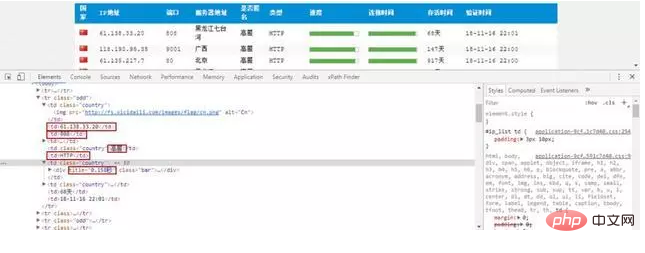
In fact, every time I crawl something, I am very afraid that my IP will be blocked, so I have to set the time delay every time. It’s going to be a little longer... This time I’m going to use Python to build a simple proxy pool. Get the proxy IP and verify its validity. However, the result does not seem to be very ideal. Why can the high-altitude proxy of West Spurs be used? ? ? Doesn’t it mean that free agents are not easy to use? It’s really a black man’s question mark face...

##NO.1 Agent Get
01 Web page analysisGet web page information by clicking on the domestic high-hidden agent of Xisha Agent. Get the IP address, port, anonymous or not, type, speed.

import time
import requests
from bs4 import BeautifulSoup
headers = {
'User-Agent': 'Mozilla/5.0 (Windows NT 6.1; WOW64) AppleWebKit/537.36 (KHTML, like Gecko) Chrome/63.0.3239.132 Safari/537.36'
}
for i in range(1, 36):
time.sleep(2)
print('第' + str(i) + '页')
url = 'http://www.xicidaili.com/nn/' + str(i)
response = requests.get(url=url, headers=headers)
soup = BeautifulSoup(response.text, 'html.parser')
all_trs = soup.find_all('tr')
for tr in all_trs[1:]:
all_tds = tr.find_all('td')
ip = all_tds[1].get_text()
port = all_tds[2].get_text()
anonymous = all_tds[4].get_text()
type = all_tds[5].get_text()
for j in all_tds[6].find_all("div", attrs={"class": "bar"}):
speed = j.get('title')
with open('ip.csv', 'a+', encoding='utf-8-sig') as f:
f.write(ip + ',' + port + ',' + anonymous + ',' + type + ',' + speed + '\n')
def get_user_agent():
'''
随机获取一个用户代理
'''
user_agents=[
"Mozilla/4.0 (compatible; MSIE 6.0; Windows NT 5.1; SV1; AcooBrowser; .NET CLR 1.1.4322; .NET CLR 2.0.50727)",
"Mozilla/4.0 (compatible; MSIE 7.0; Windows NT 6.0; Acoo Browser; SLCC1; .NET CLR 2.0.50727; Media Center PC 5.0; .NET CLR 3.0.04506)",
"Mozilla/4.0 (compatible; MSIE 7.0; AOL 9.5; AOLBuild 4337.35; Windows NT 5.1; .NET CLR 1.1.4322; .NET CLR 2.0.50727)",
"Mozilla/5.0 (Windows; U; MSIE 9.0; Windows NT 9.0; en-US)",
"Mozilla/5.0 (compatible; MSIE 9.0; Windows NT 6.1; Win64; x64; Trident/5.0; .NET CLR 3.5.30729; .NET CLR 3.0.30729; .NET CLR 2.0.50727; Media Center PC 6.0)",
"Mozilla/5.0 (compatible; MSIE 8.0; Windows NT 6.0; Trident/4.0; WOW64; Trident/4.0; SLCC2; .NET CLR 2.0.50727; .NET CLR 3.5.30729; .NET CLR 3.0.30729; .NET CLR 1.0.3705; .NET CLR 1.1.4322)",
"Mozilla/4.0 (compatible; MSIE 7.0b; Windows NT 5.2; .NET CLR 1.1.4322; .NET CLR 2.0.50727; InfoPath.2; .NET CLR 3.0.04506.30)",
"Mozilla/5.0 (Windows; U; Windows NT 5.1; zh-CN) AppleWebKit/523.15 (KHTML, like Gecko, Safari/419.3) Arora/0.3 (Change: 287 c9dfb30)",
"Mozilla/5.0 (X11; U; Linux; en-US) AppleWebKit/527+ (KHTML, like Gecko, Safari/419.3) Arora/0.6",
"Mozilla/5.0 (Windows; U; Windows NT 5.1; en-US; rv:1.8.1.2pre) Gecko/20070215 K-Ninja/2.1.1",
"Mozilla/5.0 (Windows; U; Windows NT 5.1; zh-CN; rv:1.9) Gecko/20080705 Firefox/3.0 Kapiko/3.0",
"Mozilla/5.0 (X11; Linux i686; U;) Gecko/20070322 Kazehakase/0.4.5",
"Mozilla/5.0 (X11; U; Linux i686; en-US; rv:1.9.0.8) Gecko Fedora/1.9.0.8-1.fc10 Kazehakase/0.5.6",
"Mozilla/5.0 (Windows NT 6.1; WOW64) AppleWebKit/535.11 (KHTML, like Gecko) Chrome/17.0.963.56 Safari/535.11",
"Mozilla/5.0 (Macintosh; Intel Mac OS X 10_7_3) AppleWebKit/535.20 (KHTML, like Gecko) Chrome/19.0.1036.7 Safari/535.20",
"Opera/9.80 (Macintosh; Intel Mac OS X 10.6.8; U; fr) Presto/2.9.168 Version/11.52",
"Mozilla/5.0 (Windows NT 6.1; WOW64) AppleWebKit/536.11 (KHTML, like Gecko) Chrome/20.0.1132.11 TaoBrowser/2.0 Safari/536.11",
"Mozilla/5.0 (Windows NT 6.1; WOW64) AppleWebKit/537.1 (KHTML, like Gecko) Chrome/21.0.1180.71 Safari/537.1 LBBROWSER",
"Mozilla/5.0 (compatible; MSIE 9.0; Windows NT 6.1; WOW64; Trident/5.0; SLCC2; .NET CLR 2.0.50727; .NET CLR 3.5.30729; .NET CLR 3.0.30729; Media Center PC 6.0; .NET4.0C; .NET4.0E; LBBROWSER)",
"Mozilla/4.0 (compatible; MSIE 6.0; Windows NT 5.1; SV1; QQDownload 732; .NET4.0C; .NET4.0E; LBBROWSER)",
"Mozilla/5.0 (Windows NT 6.1; WOW64) AppleWebKit/535.11 (KHTML, like Gecko) Chrome/17.0.963.84 Safari/535.11 LBBROWSER",
"Mozilla/4.0 (compatible; MSIE 7.0; Windows NT 6.1; WOW64; Trident/5.0; SLCC2; .NET CLR 2.0.50727; .NET CLR 3.5.30729; .NET CLR 3.0.30729; Media Center PC 6.0; .NET4.0C; .NET4.0E)",
"Mozilla/5.0 (compatible; MSIE 9.0; Windows NT 6.1; WOW64; Trident/5.0; SLCC2; .NET CLR 2.0.50727; .NET CLR 3.5.30729; .NET CLR 3.0.30729; Media Center PC 6.0; .NET4.0C; .NET4.0E; QQBrowser/7.0.3698.400)",
"Mozilla/4.0 (compatible; MSIE 6.0; Windows NT 5.1; SV1; QQDownload 732; .NET4.0C; .NET4.0E)",
"Mozilla/4.0 (compatible; MSIE 7.0; Windows NT 5.1; Trident/4.0; SV1; QQDownload 732; .NET4.0C; .NET4.0E; 360SE)",
"Mozilla/4.0 (compatible; MSIE 6.0; Windows NT 5.1; SV1; QQDownload 732; .NET4.0C; .NET4.0E)",
"Mozilla/4.0 (compatible; MSIE 7.0; Windows NT 6.1; WOW64; Trident/5.0; SLCC2; .NET CLR 2.0.50727; .NET CLR 3.5.30729; .NET CLR 3.0.30729; Media Center PC 6.0; .NET4.0C; .NET4.0E)",
"Mozilla/5.0 (Windows NT 5.1) AppleWebKit/537.1 (KHTML, like Gecko) Chrome/21.0.1180.89 Safari/537.1",
"Mozilla/5.0 (Windows NT 6.1; WOW64) AppleWebKit/537.1 (KHTML, like Gecko) Chrome/21.0.1180.89 Safari/537.1",
"Mozilla/5.0 (iPad; U; CPU OS 4_2_1 like Mac OS X; zh-cn) AppleWebKit/533.17.9 (KHTML, like Gecko) Version/5.0.2 Mobile/8C148 Safari/6533.18.5",
"Mozilla/5.0 (Windows NT 6.1; Win64; x64; rv:2.0b13pre) Gecko/20110307 Firefox/4.0b13pre",
"Mozilla/5.0 (X11; Ubuntu; Linux x86_64; rv:16.0) Gecko/20100101 Firefox/16.0",
"Mozilla/5.0 (Windows NT 6.1; WOW64) AppleWebKit/537.11 (KHTML, like Gecko) Chrome/23.0.1271.64 Safari/537.11",
"Mozilla/5.0 (X11; U; Linux x86_64; zh-CN; rv:1.9.2.10) Gecko/20100922 Ubuntu/10.10 (maverick) Firefox/3.6.10"
]
# random.choice返回列表的随机项
user_agent = random.choice(user_agents)
return user_agent
# random.randint产生随机整数
time.sleep(2 + float(random.randint(1, 100)) / 20)NO.2 Agent verification
Through verification, I found that most of them can be used, but I don’t know whether they are true or false. The website uses the website that previously recognized the verification code, such as Yunge Novel Network. Only 2 out of 200 are invalid, unscientific~import pandas as pd
import numpy as np
import requests
import time
df = pd.read_csv('ip.csv', header=None, names=["ip", "port", "anonymous", "proxy_type", "speed"])
proxy_types = ["{}".format(i) for i in np.array(df['proxy_type'])]
ips = ["{}".format(i) for i in np.array(df['ip'])]
ports = ["{}".format(i) for i in np.array(df['port'])]
proxy_url = ['{0}://{1}:{2}'.format(proxy_types[i], ips[i], ports[i]) for i in range(len(ips))]
proxy_type = ['{}'.format(i) for i in proxy_types]
for i in range(200):
time.sleep(1)
proxies = {
proxy_type[i]: proxy_url[i]
}
try:
response = requests.get('http://www.quanben9.com/', proxies=proxies)
except Exception as e:
print('invalid ip and port')
else:
code = response.status_code
if code == 200:
print('effective ip')
with open('effective_ip.csv', 'a+', encoding='utf-8-sig') as f:
f.write(proxy_type[i] + ',' + proxy_url[i] + '\n')
else:
print('invalid ip and port')NO.3 Summary
IP protocol: Internet Protocol, its function is to combine various The data packet is transmitted to the other party (two important conditions, IP address and MAC address). IP address: Indicates the address assigned to the node. Port: Ports are marked by port numbers. Port numbers are only integers, ranging from 0 to 65535. There are 65536 ports for an IP address. "IP address port number" distinguishes different services (Web, FTP, SMTP). HTTP: Hypertext Transfer Protocol, completes a series of operational processes from client to server. HTTPS: HTTP with encryption and authentication mechanisms added. To be honest, I didn’t know anything about IP addresses, ports, HTTP, and HTTPS before. I’ve been reading Illustrated HTTP recently, and I have some understanding of them, but it’s only a little bit, and there’s still a long way to go. However, Rome was not built in a day, and progress is a good thing! [Recommended course:Python column course]
The above is the detailed content of Build a simple proxy pool using Python. For more information, please follow other related articles on the PHP Chinese website!